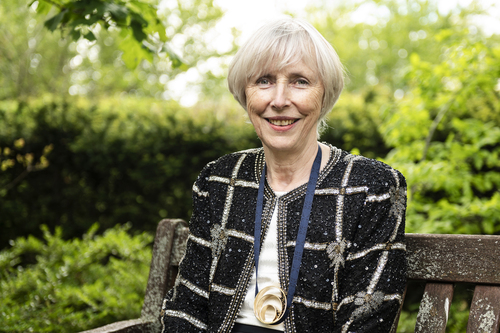The Saunders Genetics Lecture will be held on Monday 19th February 2024, 4:30 - 6pm at the Babbage Lecture Theatre in the David Attenborough Building, New Museums Site, Cambridge.
In addition, we will a hold a ceremony to unveil Genetics Society Blue Plaques honouring Edith Saunders and William Bateson. As well as a Blue Plaque to celebrate the Nobel prize work completed by Sir Martin Evans in the Department of Genetics building.
This will be the fourth of a prestigious series of lectures held in commemoration of the life and work of Edith Rebecca (Becky) Saunders who made major contributions to the understanding of genetics and heredity at the beginning of the 20th century. Saunders entered Newnham College in 1884, continued her postgraduate research as a Bathurst student from 1888 to 1889, and later became the director of the Balfour Biological Laboratory for Women in 1899. She was Director of Studies for Natural Sciences at Newnham between 1918 and 1925 and President of the Genetical Society from 1936-1938.
The Saunders Genetics Lectures celebrates the best contemporary research in Genetics today, with invited speakers being selected for their contribution to research which resonates with the activities of the Department of Genetics and across the School of Biological Sciences.
We are delighted to welcome Professor Dame Caroline Dean, Royal Society Professor at the John Innes Centre, Norwich as our speaker for the 2024 Saunders Lecture. The title of Caroline's talk is “Co-transcriptional and memory mechanisms registering winter.”
Professor Dame Caroline Dean is a Royal Society Professor at the John Innes Centre in Norwich, which she joined as a group leader after a PhD at the University of York and postdoctoral work at Advanced Genetic Sciences in the USA. Caroline has made outstanding contributions to understanding developmental timing in plants with a particular focus on how plants remember and respond to environmental cues. She is the recipient of several distinguished awards, including the Royal Society Darwin (2016) and Royal (2020) Medals, The Genetics Society Medal (2007), the FEBS/EMBO Women in Science Award (2015), the L'Oréal-UNESCO For Women in Science Award (2018) and the Wolf Prize in Agriculture (2020). She is a Fellow of the Royal Society, and a member of EMBO, US National Academy of Sciences and the German National Academy of Sciences.
Caroline will discuss her work on how organisms extract signals from noisy environments. Plants are an excellent system to investigate this question as many aspects of the environment regulate their growth and development. Naturally fluctuating temperature signals are registered throughout winter in the process of vernalization, to align flowering with favourable spring conditions. In Arabidopsis, vernalization involves the epigenetic silencing of the floral repressor FLC. Molecular dissection of this mechanism has revealed that temperature sensing is distributed throughout the FLC regulatory network. Multiple facets of the fluctuating temperature profile are monitored, directly through co-transcriptional changes of FLC sense and antisense transcription, and indirectly through reduced cell division. These changes are integrated via a low probability Polycomb-mediated chromatin switch, locally at each allele. The talk will describe our understanding of this switching mechanism, aspects of which are likely to be relevant to other organisms, where complex environmental cues mediate epigenetic regulation.
You can find out more about Saunders' history associated with the Department of Genetics here.

